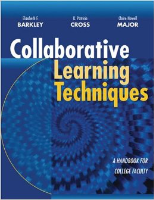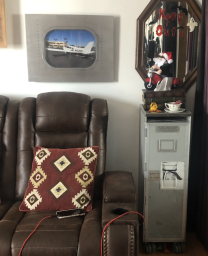
1. Discussion
Student interaction and exchange is achieved primarily through spoken words.
|
Think-Pair-Share |
|
Students think individually for a few minutes, then discuss and compare their responses with a partner before sharing with the entire class |
|
Useful for preparing students to participate more fully and effectively in whole class discussions |
|
Group size: pairs |
|
Time on task: 5-15 minutes |
|
Duration of groups: single session |
|
Online transferability: low |
|
Round Robin |
|
Students generate ideas and speak in order moving from one student to the next |
|
Useful for structuring brainstorming sessions and ensuring that all students participate |
|
Group size: 4-6 |
|
Time on task: 5-15 minutes |
|
Duration of groups: single session |
|
Online transferability: low |
|
Buzz Groups |
|
Students discuss course-related questions informally in small groups of peers |
|
Useful for generating lots if information and ideas in a short period of time to prepare for and improve whole-class discussions |
|
Group size: 4-6 |
|
Time on task: 10-15 minutes |
|
Duration of groups: single session |
|
Online transferability: low |
|
Talking Chips |
|
Students participate in a group discussion and surrender a token each time they speak |
|
Useful for ensuring equitable participation |
|
Group size: 4-6 |
|
Time on task: 10-20 minutes |
|
Duration of groups: single session |
|
Online transferability: low |
|
Three-Step Interview |
|
Students interview each other and report what they learn to another pair |
|
Useful for helping students network and improve communication skills |
|
Group size: 2, then 4 |
|
Time on task: 15-30 minutes |
|
Duration of groups: single session |
|
Online transferability: moderate |
|
Critical Debates |
|
Students assume and argue the side of an issue that is in opposition to their personal views |
|
Useful for developing critical thinking skills and encouraging students to challenge their existing assumptions |
|
Group size: 4-6, then 8-12 |
|
Time on task: 1-2 hours |
|
Duration of groups: single session |
|
Online transferability: moderate |
2. Reciprocal teaching
aka reciprocal peer teaching
Students purposefully help each other master subject matter content and develop discipline-based skills.
|
Note-taking Pairs |
|
Students pool information from their individual notes to create an improved, partner version |
|
Useful for helping students acquire missing information and correct inaccuracies in their notes and learn to become better note takers |
|
Group size: pairs |
|
Time on task: 5-15 minutes |
|
Duration of groups: single session or multiple |
|
Online transferability: moderate |
|
Learning Cell |
|
Students quiz each other using questions they have developed individually about a reading assignment or other learning activity |
|
Useful for engaging students actively in thinking about content and encouraging them to challenge each other to pursue deeper levels of thought |
|
Group size: pairs |
|
Time on task: 15-30 minutes |
|
Duration of groups: single session, multiple, or all term |
|
Online transferability: moderate |
|
Fishbowl |
|
Students form concentric circles with the smaller, inside group of students discussing and the larger, outside group listening and observing |
|
Useful for providing opportunities for students to model or observe group processes in a discussion setting |
|
Group size: 3-5 inside, remaining students outside |
|
Time on task: 15-20 minute discussion, 10-15 minute debriefing |
|
Duration of groups: single session |
|
Online transferability: moderate |
|
Role Play |
|
Students assume a different identity and act out a scenario |
|
Useful for engaging students in a creative activity that helps them “learn by doing” |
|
Group size: 2-5 |
|
Time on task: 15-45 minutes |
|
Duration of groups: single session |
|
Online transferability: high |
|
Jigsaw |
|
Students develop knowledge about a given topic and then teach it to others |
|
Useful for motivating students to learn and process information deeply enough to teach it to their peers |
|
Group size: 4-6, recombine to 4-6 |
|
Time on task: varies |
|
Duration of groups: single session or multiple |
|
Online transferability: moderate |
|
Test-taking teams |
|
Students prepare for a test in working groups, take the test individually, and then retake the test in their groups |
|
Useful for helping students assess and improve their understanding of subject matter as they also teach each other test-taking strategies |
|
Group size: 4-6 |
|
Time on task: proportional to exam |
|
Duration of groups: proportional to exam |
|
Online transferability: moderate |
3. Problem Solving
Students focus on practicing problem-solving strategies.
|
Think-Aloud Pair Problem Solving (TAPPS) |
|
Students solve problems aloud to try out their reasoning on a listening partner |
|
Useful for emphasizing the problem-solving process (rather than the product) and helping students identify logic or process errors |
|
Group size: pairs |
|
Time on task: 30-45 minutes |
|
Duration of groups: single session or multiple |
|
Online transferability: low |
|
Send-A-Problem |
|
Students try to solve a problem as a group, and then pass the problem and solution to a nearby group who does the same; the final group evaluate the solutions |
|
Useful for helping students practice together the thinking skills required for effective problem solving and for comparing and discriminating among multiple solutions |
|
Group size: 2-4 |
|
Time on task: 30-45 minutes |
|
Duration of groups: single session |
|
Online transferability: moderate |
|
Case Study |
|
Students review a written study of a real-world scenario and develop a solution to the dilemma presented in the case |
|
Useful for presenting abstract principles and theories in ways that students find relevant |
|
Group size: 3-6 |
|
Time on task: varies |
|
Duration of groups: single session or multiple |
|
Online transferability: moderate |
|
Structured Problem Solving |
|
Students follow a structured format to solve problems |
|
Useful for dividing problem-solving processes into manageable steps so that students do not feel overwhelmed and so that they learn to identify, analyze, and solve problems in an organized manner |
|
Group size: 4-6 |
|
Time on task: 1-2 hours |
|
Duration of groups: multiple sessions |
|
Online transferability: high |
|
Analytic Teams |
|
Students assume roles and specific tasks to perform when critically reading an assignment, listening to a lecture, or watching a video |
|
Useful for helping students understand the different activities that constitute a critical analysis |
|
Group size: 4-5 |
|
Time on task: 15-45 minutes |
|
Duration of groups: single session |
|
Online transferability: high |
|
Group Investigation |
|
Students plan, conduct, and report on in-depth research projects |
|
Useful for teaching students research procedures and helping them to gain in-depth knowledge about a specific area |
|
Group size: 2-5 |
|
Time on task: several hours |
|
Duration of groups: multiple to all term |
|
Online transferability: moderate |
4. Information Organizing
aka Graphic Information Organizers
Groups use visual tools to organize and display information.
|
Affinity Grouping |
|
Students generate ideas, identify common themes, and then sort and organize the ideas accordingly |
|
Useful for helping students “unpack” a complicated topic and identify and classify its constituent parts |
|
Group size: 3-5 |
|
Time on task: 30-45 minutes |
|
Duration of groups: single session |
|
Online transferability: low |
|
Group Grid |
|
Students are given pieces of information and asked to place them in the blank cells of a grid according to category rubrics |
|
Useful for clarifying conceptual categories and developing sorting skills |
|
Group size: 2-4 |
|
Time on task: 15-45 minutes |
|
Duration of groups: single session |
|
Online transferability: low |
|
Team Matrix |
|
Students discriminate between similar concepts by noticing and marking on a chart the presence or absence of important, defining features |
|
Useful for distinguishing among closely related concepts |
|
Group size: pairs |
|
Time on task: 10-20 minutes |
|
Duration of groups: single session |
|
Online transferability: low |
|
Sequence Chains |
|
Students analyze and depict graphically a series of events, actions, roles, or decisions |
|
Useful for understanding processes, cause and effect, and chronological series, and organizing information in an orderly, coherent progression |
|
Group size: 2-3 |
|
Time on task: 15-45 minutes |
|
Duration of groups: single session |
|
Online transferability: low |
|
Word Webs |
|
Students generate a list of related ideas and then organize them in a graphic, identifying relationships by drawing lines or arrows to represent the connections |
|
Useful for figuring out and representing relationships; like maps, they can show both the destination and the sites and sights along the way |
|
Group size: 2-4 |
|
Time on task: 30-45 minutes |
|
Duration of groups: single session |
|
Online transferability: low |
5. Collaborative Writing
Students write in order to learn important course content and skills.
|
Dialogue Journals |
|
Students record their thoughts in a journal that they exchange with their peers for comments and questions |
|
Useful for connecting course work to students’ personal lives and interacting with each other in content-related and thoughtful ways |
|
Group size: pairs |
|
Time on task: varies |
|
Duration of groups: single to multiple sessions |
|
Online transferability: high |
|
Round Table |
|
Students take turns responding to a prompt by writing one or two words, phrases, or sentences before passing the paper along to others who do the same |
|
Useful for practicing writing informally and creating a written record of ideas |
|
Group size: 3-4 |
|
Time on task: 10-20 minutes |
|
Duration of groups: single class |
|
Online transferability: moderate |
|
Dyadic Essays |
|
Students write essay questions and model answers for each other, exchange questions, and after responding, compare their answers to the model answer |
|
Useful for identifying the most important feature of a learning activity and formulating and answering questions about that activity |
|
Group size: pairs |
|
Time on task: 30-45 minutes |
|
Duration of groups: single or multiple sessions |
|
Online transferability: high |
|
Peer Editing |
|
Students critically review and provide editorial feedback on a peer’s essay, report, argument, research paper, or other writing assignment |
|
Useful for developing critical editing skills and giving each other constructive criticism to improve papers before they submit them for grading |
|
Group size: pairs |
|
Time on task: 2 hours |
|
Duration of groups: multiple sessions |
|
Online transferability: high |
|
Collaborative Writing |
|
Students write a formal paper together |
|
Useful for learning and performing the stages of writing more effectively |
|
Group size: 2-3 |
|
Time on task: several hours |
|
Duration of groups: multiple sessions |
|
Online transferability: high |
|
Team Anthologies |
|
Students develop a compilation of course-related readings with student reactions to the material |
|
Useful for experiencing the research process without writing a formal research paper |
|
Group size: 4 then 2 then 4 |
|
Time on task: several hours |
|
Duration of groups: multiple sessions |
|
Online transferability: moderate |
|
Paper Seminar |
|
Students write and then present an original paper, receive formal feedback from selected peers, and engage in a general discussion of the issues in the paper with the entire group |
|
Useful for engaging in deep discussion about their research and providing individual students with focused attention and feedback on the student’s work |
|
Group size: 4-6 |
|
Time on task: varies |
|
Duration of groups: multiple sessions |
|
Online transferability: high |
Contact Me
Sarah Nilsson, J.D., Ph.D., MAS
602 561 8665
You can also fill out my
Get Social with Me
Legal Disclaimer
The information on this website is for EDUCATIONAL purposes only and DOES NOT constitute legal advice.
While the author of this website is an attorney, she is not YOUR attorney, nor are you her client, until you enter into a written agreement with Nilsson Law, PLLC to provide legal services.
In no event shall Sarah Nilsson be liable for any special, indirect, or consequential damages relating to this material, for any use of this website, or for any other hyperlinked website.
Steward of
I endorse the following products
KENNON (sun shields)









